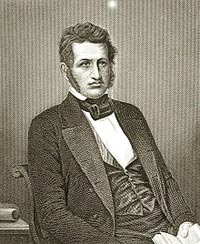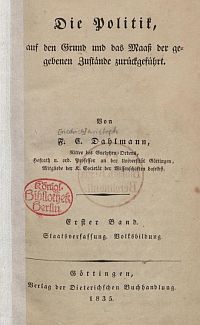


Friedrich Christoph Dahlmann
Wismar 1785 - Bonn 1860
Historian and politician, he played an active role in the events leading to the Unification of Germany. In 1812 he was called to the University of Kiel (Schleswig-Holstein), at the time under the Danish crown, where he became secretary to the perpetual deputation of the estates of Schleswig-Holstein. In 1829 he went to Gőttingen; he was one of the famous seven professors that protested against Ernst August I of Hanover who had declared the constitution invalid. In the years that followed he devoted himself to lecturing and composing his most famous works and in 1842 he was called to a professorship at the University of Bonn. He played a decisive role in the events of 1848, advocating the reunification of the German states under the Prussian sceptre.
Main works: Quellenkunde der deutschen Geschichte (Göttingen 1830); Die Politik, auf den Grund und das Maaß der gegebenen Zustände zurückgeführt (Göttingen 1835); Geschichte von Dänemark (Hamburg 1840-43); Geschichte der englischen Revolution (Leipzig 1844); Geschichte der französischen Revolution (Leipzig 1845).
Bibliography: W. Bleek, Friedrich Christoph Dahlmann und die „gute“ Verfassung, «Politische Vierteljahresschrift», XLVIII, 1, 2007, pp. 28-43; M. Riedel, Politik und Geschichte. F. C. Dahlmann und der Ausgang der Aristoteles-Tradition, in Metaphysik und Metapolitik. Studien zu Aristoteles und zur politischen Sprache der neuzeitlichen Philosophie, Frankfurt a.M. 1975, pp. 307-29; H. Heimpel, Zwei Historiker. Friedrich Christoph Dahlmann, Jacob Burckhardt, Göttingen 1962.